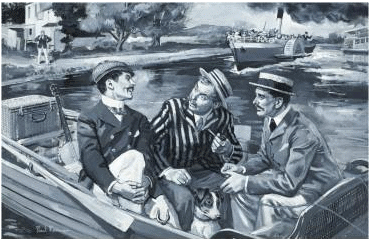The act of tresspassing
Harris and Jim stopped under the willows by Kempton Park and lunched. It was a pleasant little spot. They had just begun to eat the bread and jam when a gentleman in a short sleeves and a short pipe came along. He asked them if they knew that they were tresspassing and told them that it was his duty to turn them off. Harris was a well- made man and looked hard and bony. He asked the gentleman how he would accomplish his task. He said that he would consult his master and went away. He never returned. Actually he wanted a shilling and was trying to blackmail them. But both Harris and Jim were angry and blamed the owners who allowed that to happen. The narrator wanted to kill the owner, but Harris wanted to kill him, his family, friends, relatives, and bum down his house. Harris decided to calm himself by singing a comic songs of the ruins.
Harris as a singer
It was one of Harris’ fixed ideas that he could sing a comic song. But 1l his friends knew that he could not sing, and would never be able to sing, and that he should not be allowed to sing. Harris did not know that he made an ass of himself when he Sang. He did not realise that he annoyed many.
A German singer
Jim was reminded of an incident which threw light on the inner working of human mind. Once he was at a fashionable and highly cultured party. There were two young students who had come back from Germany. They asked if they had heard Herr Slossenn Boschen sing his great German comic song. No one had heard it. The young man said that it was the funniest song that had ever been written. They could get Herr Slossenn Boschen to sing it. They brought him and he sat down to the piano and began to sing. The prelude did not suggest a comic song. It was a soulful music. The narrator who did not understand German simply watched the two young men. When they tittered, the narrator tittered; when they roared, he also roared. He noticed that as the song progressed, most of the listeners seemed to be doing the same. Yet the German professor did not seem happy. He was surprised when they began to Laugh. As the listeners continued to laugh, he got angry and ended his song amidst their laughter. He got up, swore at them, and then danced and shook his fists. He said that he had never been so insulted in all his life.
Grave misunderstanding
It appeared that the song was not comic at all. It was about a young girl who had given UP her life to save her lover’s soul. It was a tragic song. The two young men who had done this thing disappeared. They had taken their revenge for being considered common persons. The narrator never saw a party break up so quietly. They did not say goodnight to one another.
Different places
They reached Sunburry Lock at half-past three. And then they sculled up to Walton and went past Oatlands Park, a famous old place. Henry VIII lived here. The late Duchess of York who lived at Oatlands, was very fond of dogs. She had a special graveyard made for the large number of dogs she had kept. At Weybridge they saw George’s blazer on one of the lock gates.
George joins in
Montmorency gave a furious bark, Jim shrieked and Harris roared. George waved his hat and yelled back. The lock keeper rushed out thinking that someone had fallen into the lock. George had a banjo with him. He thought that it was very easy to learn the banjo.
